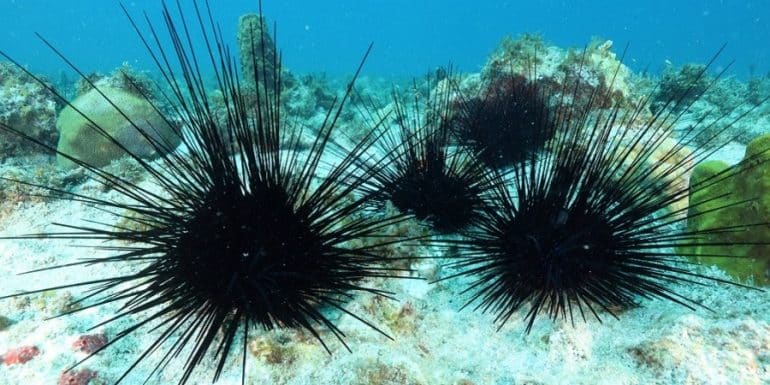An outbreak that has killed all the sea urchins in the Gulf of Eilat and elsewhere in the Middle East is threatening to destroy coral reefs in those areas, a study published Wednesday found.
"This situation is unprecedented in the entire documented history of the Gulf of Eilat," said a team of researchers from Tel Aviv University. The researchers noted that widespread mortality is also occurring in other countries in the region, including Jordan, Egypt, Saudi Arabia, Greece and Turkey.
TAU's findings were recently published in Frontiers in Marine Science and Royal Society Open Science, both peer-reviewed.
Coral reefs act as nurseries and habitats for countless marine species, providing shelter, food and protection from predators. They also serve as a natural barrier, reducing coastal erosion and protecting against storm damage. Coral reefs also trap carbon that would otherwise be released into the atmosphere, helping to mitigate the effects of climate change.
Rising sea temperatures, pollution, overfishing and human activities pose significant challenges to reef survival Now, an epidemic that is killing sea urchins also poses a dire threat.
The source of the pandemic is believed to be a pathogenic ciliate parasite that wiped out entire sea urchin populations in the Caribbean in the 1980s, damaging coral reefs there beyond repair, the researchers wrote.
The current outbreak was first discovered in the Mediterranean but quickly reached the Red Sea, where it is spreading at an unprecedented rate.
Within a few months, the epidemic killed all the black sea urchins in the Gulf of Eilat. they died within two days of becoming ill.
Sea urchins are considered essential to the healthy functioning of coral reefs, the study says.
"At first we thought it was some kind of pollution or poisoning or a local chemical spill from industry and hotels north of the Gulf of Eilat, but when we looked at additional sites in Eilat, Jordan and the Sinai, we quickly realized that this was not local occurrence," said Omri Bronstein of Tel Aviv University, who led the study.
"All the findings point to a rapidly spreading epidemic," he said.
He noted that similar reports are coming from colleagues in Saudi Arabia.
"Even the sea urchins that we grow for research purposes in our aquariums at the Interuniversity Institute [for Marine Sciences in Eilat] and the sea urchins at the Underwater Observatory Marine Park in Eilat contracted the disease and died, possibly because the pathogen entered the pumping systems." , Bronstein said.
Within two days of being infected with the parasite, a healthy sea urchin becomes a skeleton with massive tissue loss. While some carcasses wash ashore, most sea urchins are swallowed while dying and unable to defend themselves, which could accelerate transmission of the contagion from prey fish.
“As with the COVID-19, at this point, no one knows what will happen – will this epidemic go away on its own or will it stay with us for many years and cause a dramatic change in coral reefs?” Bronstein said.
An emergency report describing the situation has been submitted to Israel's Nature and Parks Authority, and emergency measures to save the coral reef are being considered. (ANI/TPS)
Source: Ert.gr
